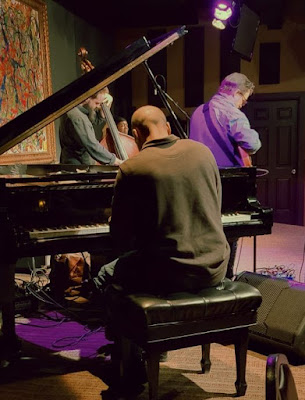Toward midweek: Local jazz friends debut quartet focusing on leading guitarist
 |
| Nick Tucker (from left), Kenny Phelps, Steven Jones, Charlie Ballantine |
They've all performed in various combinations before, but the quartet that Charlie Ballantine put together for two sets at the Jazz Kitchen Tuesday night was a new group. It made its debut in sets that relied on jazz standards and Great American Songbook items.
For the first time out, the quartet seemed thoroughly attuned to each other, as if they had everything to suggest a well-honed ensemble except originals.
No surprise about that rapport, once you learn who accompanied the guitarist in two well-designed sets: Steven Jones on piano, Nick Tucker on bass, and Kenny Phelps on drums — something of a local all-star lineup.
This was enough by itself to promise something extraordinary. And, from "Alone Together" through Clifford Brown's "Sandu," that's what a large weeknight crowd got. There were fresh colors applied and each tune's personality imaginatively engaged with. "In Walked Bud," a Thelonious Monk favorite, had a sly, strolling quality from the muted resonance Ballantine gave to his introduction. The ensemble got into the walking mood with a combination of stroll and Nawlins shuffle. Ballantine hit his stride in his solo after the band's full statement.
The fast and funky "When Will the Blues Leave?" displayed the exuberance of the players, with some massive 12-bar exchanges with the drummer. Phelps was sometimes in a torrential mood, especially at the end of each solo episode, energizing the near-capacity crowd. Jones cast his entire solo in fleet octaves: a single-line melodic chain doubled at the octave.
A wry take on "How Deep Is the Ocean?," the imperishable Irving Berlin evergreen, was followed by a thumping "Four on Six," a Wes Montgomery classic; Jones turned in a chordal solo as if he were a different piano player. Tucker's bass solo, typical of his generous, all-over inventiveness, turned wailing near the end — and how often do you think of an upright-bass player as wailing?
The second set, with hardly a patron choosing to exit the room, was just as fulfilling. Charlie Parker's "Steeplechase" and Wayne Shorter's "Fee-Fi-Fo-Fum" further displayed the quartet's mastery of signature styles. Ballantine and Jones soloed with particular distinction in Ellington's "U.M.M.G," which the composer introduced to Dizzy Gillespie, sitting in with the band, on the 1959 LP "Ellington Jazz Party" (one of the first records I bought for my burgeoning collection as a teen).
"Sandu" brought things to a finish, taken in mid-tempo style, with Tucker staying in touch in deft accompaniment to Phelps' soloing. This was an example of jazz brotherhood at work that was characteristic of the whole show. No one got in anyone else's way, and every member's strength was maximized by the strength that his mates brought to the bandstand.
[Photo by Rob Ambrose]



Comments
Post a Comment